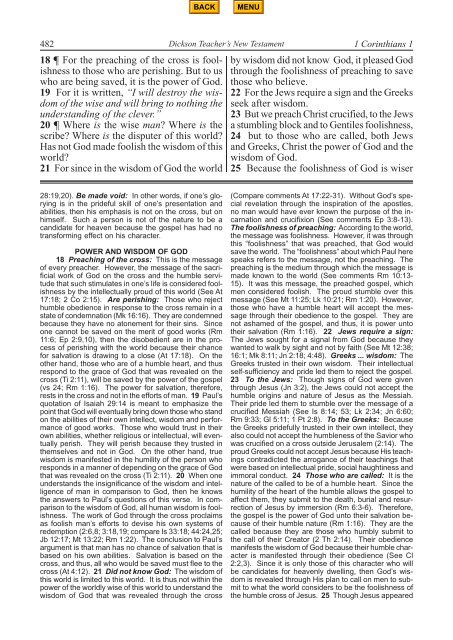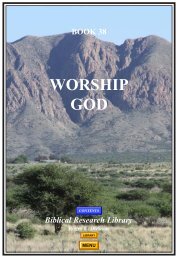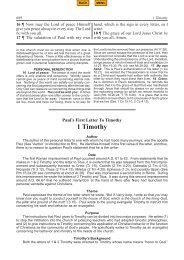1 Corinthians
1 Corinthians
1 Corinthians
You also want an ePaper? Increase the reach of your titles
YUMPU automatically turns print PDFs into web optimized ePapers that Google loves.
482 Dickson Teacher’s New Testament<br />
18 For the preaching of the cross is foolishness<br />
to those who are perishing. But to us<br />
who are being saved, it is the power of God.<br />
19 For it is written, “I will destroy the wisdom<br />
of the wise and will bring to nothing the<br />
understanding of the clever.”<br />
20 Where is the wise man Where is the<br />
scribe Where is the disputer of this world<br />
Has not God made foolish the wisdom of this<br />
world<br />
21 For since in the wisdom of God the world<br />
1 <strong>Corinthians</strong> 1<br />
by wisdom did not know God, it pleased God<br />
through the foolishness of preaching to save<br />
those who believe.<br />
22 For the Jews require a sign and the Greeks<br />
seek after wisdom.<br />
23 But we preach Christ crucified, to the Jews<br />
a stumbling block and to Gentiles foolishness,<br />
24 but to those who are called, both Jews<br />
and Greeks, Christ the power of God and the<br />
wisdom of God.<br />
25 Because the foolishness of God is wiser<br />
28:19,20). Be made void: In other words, if one’s glorying<br />
is in the prideful skill of one’s presentation and<br />
abilities, then his emphasis is not on the cross, but on<br />
himself. Such a person is not of the nature to be a<br />
candidate for heaven because the gospel has had no<br />
transforming effect on his character.<br />
POWER AND WISDOM OF GOD<br />
18 Preaching of the cross: This is the message<br />
of every preacher. However, the message of the sacrificial<br />
work of God on the cross and the humble servitude<br />
that such stimulates in one’s life is considered foolishness<br />
by the intellectually proud of this world (See At<br />
17:18; 2 Co 2:15). Are perishing: Those who reject<br />
humble obedience in response to the cross remain in a<br />
state of condemnation (Mk 16:16). They are condemned<br />
because they have no atonement for their sins. Since<br />
one cannot be saved on the merit of good works (Rm<br />
11:6; Ep 2:9,10), then the disobedient are in the process<br />
of perishing with the world because their chance<br />
for salvation is drawing to a close (At 17:18). On the<br />
other hand, those who are of a humble heart, and thus<br />
respond to the grace of God that was revealed on the<br />
cross (Ti 2:11), will be saved by the power of the gospel<br />
(vs 24; Rm 1:16). The power for salvation, therefore,<br />
rests in the cross and not in the efforts of man. 19 Paul’s<br />
quotation of Isaiah 29:14 is meant to emphasize the<br />
point that God will eventually bring down those who stand<br />
on the abilities of their own intellect, wisdom and performance<br />
of good works. Those who would trust in their<br />
own abilities, whether religious or intellectual, will eventually<br />
perish. They will perish because they trusted in<br />
themselves and not in God. On the other hand, true<br />
wisdom is manifested in the humility of the person who<br />
responds in a manner of depending on the grace of God<br />
that was revealed on the cross (Ti 2:11). 20 When one<br />
understands the insignificance of the wisdom and intelligence<br />
of man in comparison to God, then he knows<br />
the answers to Paul’s questions of this verse. In comparison<br />
to the wisdom of God, all human wisdom is foolishness.<br />
The work of God through the cross proclaims<br />
as foolish man’s efforts to devise his own systems of<br />
redemption (2:6,8; 3:18,19; compare Is 33:18; 44:24,25;<br />
Jb 12:17; Mt 13:22; Rm 1:22). The conclusion to Paul’s<br />
argument is that man has no chance of salvation that is<br />
based on his own abilities. Salvation is based on the<br />
cross, and thus, all who would be saved must flee to the<br />
cross (At 4:12). 21 Did not know God: The wisdom of<br />
this world is limited to this world. It is thus not within the<br />
power of the worldly wise of this world to understand the<br />
wisdom of God that was revealed through the cross<br />
(Compare comments At 17:22-31). Without God’s special<br />
revelation through the inspiration of the apostles,<br />
no man would have ever known the purpose of the incarnation<br />
and crucifixion (See comments Ep 3:8-13).<br />
The foolishness of preaching: According to the world,<br />
the message was foolishness. However, it was through<br />
this “foolishness” that was preached, that God would<br />
save the world. The “foolishness” about which Paul here<br />
speaks refers to the message, not the preaching. The<br />
preaching is the medium through which the message is<br />
made known to the world (See comments Rm 10:13-<br />
15). It was this message, the preached gospel, which<br />
men considered foolish. The proud stumble over this<br />
message (See Mt 11:25; Lk 10:21; Rm 1:20). However,<br />
those who have a humble heart will accept the message<br />
through their obedience to the gospel. They are<br />
not ashamed of the gospel, and thus, it is power unto<br />
their salvation (Rm 1:16). 22 Jews require a sign:<br />
The Jews sought for a signal from God because they<br />
wanted to walk by sight and not by faith (See Mt 12:38;<br />
16:1; Mk 8:11; Jn 2:18; 4:48). Greeks ... wisdom: The<br />
Greeks trusted in their own wisdom. Their intellectual<br />
self-sufficiency and pride led them to reject the gospel.<br />
23 To the Jews: Though signs of God were given<br />
through Jesus (Jn 3:2), the Jews could not accept the<br />
humble origins and nature of Jesus as the Messiah.<br />
Their pride led them to stumble over the message of a<br />
crucified Messiah (See Is 8:14; 53; Lk 2:34; Jn 6:60;<br />
Rm 9:33; Gl 5:11; 1 Pt 2:8). To the Greeks: Because<br />
the Greeks pridefully trusted in their own intellect, they<br />
also could not accept the humbleness of the Savior who<br />
was crucified on a cross outside Jerusalem (2:14). The<br />
proud Greeks could not accept Jesus because His teachings<br />
contradicted the arrogance of their teachings that<br />
were based on intellectual pride, social haughtiness and<br />
immoral conduct. 24 Those who are called: It is the<br />
nature of the called to be of a humble heart. Since the<br />
humility of the heart of the humble allows the gospel to<br />
affect them, they submit to the death, burial and resurrection<br />
of Jesus by immersion (Rm 6:3-6). Therefore,<br />
the gospel is the power of God unto their salvation because<br />
of their humble nature (Rm 1:16). They are the<br />
called because they are those who humbly submit to<br />
the call of their Creator (2 Th 2:14). Their obedience<br />
manifests the wisdom of God because their humble character<br />
is manifested through their obedience (See Cl<br />
2:2,3). Since it is only those of this character who will<br />
be candidates for heavenly dwelling, then God’s wisdom<br />
is revealed through His plan to call on men to submit<br />
to what the world considers to be the foolishness of<br />
the humble cross of Jesus. 25 Though Jesus appeared









